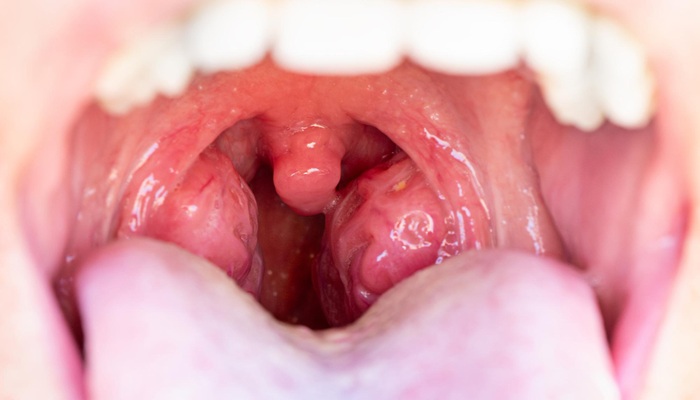Tonsillitis is an infection of the tonsils—two small, soft tissue lumps located at the back of the throat. The tonsils are part of the immune system and function to trap germs that cause illness. When infected, the tonsils typically become swollen, painful, and may cause discomfort while swallowing.
This condition is most common in children and teenagers but can also affect adults. Children under the age of 3 rarely experience tonsillitis. Most people will have tonsillitis at least once in their lifetime.
Contents
Symptoms of Tonsillitis
Tonsillitis symptoms often appear suddenly and may include:
- Sore or scratchy throat
- Pain or difficulty swallowing
- Red and swollen tonsils and throat
- White spots on the tonsils
- A white, yellow, or gray coating on the tonsils
- Fever above 38°C
- Swollen lymph nodes (located on the sides of the neck, under the ears)
- Stomach pain or vomiting (more common in younger children)
Causes of Tonsillitis
Tonsillitis is most commonly caused by viral infections, although bacterial infections can also be responsible.
Viral Tonsillitis
Around 70% of tonsillitis cases are caused by viruses such as the flu virus or the common cold virus. Symptoms of viral tonsillitis are usually milder than bacterial tonsillitis.
Bacterial Tonsillitis
Some cases are caused by bacteria, particularly Group A Streptococcus. This type of tonsillitis is often referred to as strep throat. Even people without tonsils can develop strep throat, as the infection affects the throat, not the tonsils themselves. Generally, bacterial tonsillitis symptoms are more severe than viral ones.
Risk Factors for Tonsillitis
You may be at higher risk for tonsillitis if:
- You are between the ages of 5 and 15: Tonsillitis is most common in children and teenagers.
- You are frequently exposed to germs: Those working or studying in crowded environments are more likely to contract the germs that cause tonsillitis.
Is Tonsillitis Contagious?
The viruses and bacteria that cause tonsillitis are highly contagious. They can spread in several ways:
- Kissing or sharing utensils, food, or drinks with others
- Close contact with someone who is sick
- Touching contaminated surfaces and then touching your nose or mouth
- Breathing in small airborne droplets released when an infected person coughs or sneezes
Diagnosing Tonsillitis
To diagnose tonsillitis, a doctor may perform the following steps:
- Examine the throat for redness and swelling
- Ask about accompanying symptoms such as fever, cough, runny nose, rash, or abdominal pain to rule out other illnesses
- Check the ears and nose for other signs of infection
- Feel the sides of the neck to see if lymph nodes are swollen or tender
Once tonsillitis is confirmed, the doctor will determine whether the infection is viral or bacterial. To do this, a throat culture may be needed.
This involves swabbing the back of the throat with a long cotton swab to collect cells and saliva. The sample is then tested for the presence of Group A Streptococcus. A positive result indicates bacterial strep throat, while a negative result suggests viral tonsillitis.
Treatment for Tonsillitis
Treatment depends on the cause of the infection. While symptoms may appear similar, viral and bacterial tonsillitis are treated differently. Common treatments include:
- Antibiotics: If the cause is bacterial, antibiotics such as penicillin, clindamycin, or cephalosporins may be prescribed. It’s essential to complete the full course of antibiotics even if symptoms improve within a few days, as stopping early can cause the infection to return or spread.
- Pain relievers: Over-the-counter medications such as ibuprofen or paracetamol can help relieve throat pain.
- Tonsillectomy (tonsil removal surgery): If a person experiences chronic or recurrent tonsillitis, a doctor may recommend a tonsillectomy to remove the tonsils permanently.
Can Tonsillitis Be Prevented?
Tonsillitis cannot be entirely prevented, but the risk can be reduced with good hygiene practices:
- Wash hands frequently, especially before touching your nose or mouth
- Avoid sharing food, drinks, or utensils with someone who is sick
- Replace your toothbrush every three months and after being ill
ENT Specialists at Mandaya Royal Hospital Puri Who Treat Tonsillitis
Mandaya Royal Hospital Puri is supported by a team of experienced ENT (Ear, Nose, and Throat) specialists trained in diagnosing and treating tonsillitis:
1. Prof. dr. Abdul Kadir, Ph.D, Sp.THT-KL(K), MARS

Prof. Abdul Kadir is a highly experienced ENT specialist with a medical degree and ENT specialization from Hasanuddin University, Makassar. He continued his advanced training in Otolaryngology at Hiroshima University, Japan, earning a Ph.D. He also holds a Master’s degree in Hospital Administration (MARS).
Practice schedule at Mandaya Royal Hospital Puri:
- Monday: 09.00 – 12.00 WIB
- Wednesday: 13.00 – 15.00 WIB
- Thursday: 13.00 – 15.00 WIB
2. dr. Abdillah Hasbi Assadyk, Sp.THT-BKL, MPH

dr. Abdillah is an ENT specialist who completed his medical and ENT education at the University of Indonesia. He also holds a Master of Public Health (MPH) from Gadjah Mada University, Yogyakarta.
Practice schedule at Mandaya Royal Hospital Puri:
- Wednesday: 16.00 – 19.00 WIB
- Friday: 16.00 – 20.00 WIB
- Saturday: 09.00 – 12.00 WIB & 17.00 – 19.00 WIB
3. dr. Dewi Lizanty, M.Kes, Sp.THT-BKL

dr. Dewi Lizanty is an ENT specialist practicing at Mandaya Royal Hospital Puri, with an academic background in Health Sciences (M.Kes).
Practice schedule at Mandaya Royal Hospital Puri:
- Monday: 13.00 – 15.00 WIB
- Tuesday: 13.00 – 15.00 WIB
- Friday: 13.00 – 15.00 WIB
4. dr. Handoko Nugroho Yossarsongko, Sp.THT-KL, M.Kes

dr. Handoko is a member of the Indonesian Society of Otolaryngology-Head and Neck Surgery (PERHATI-KL) and the Indonesian Medical Association (IDI). He earned his medical degree from the Christian University of Indonesia (UKI), followed by postgraduate studies in Biomedical Sciences and ENT specialization at Hasanuddin University.
Practice schedule at Mandaya Royal Hospital Puri:
- Tuesday: 16.00 – 20.00 WIB
- Thursday: 16.00 – 20.00 WIB
- Saturday: 13.00 – 16.00 WIB
5. dr. Reno Hardoyo Kelan, Sp.THT-KL

dr. Reno graduated from the Faculty of Medicine, University of Indonesia, both as a general practitioner and ENT specialist. He is skilled in ENT procedures such as surgery, ear endoscopy, ear irrigation, and hearing evaluations.
Practice schedule at Mandaya Royal Hospital Puri:
- Monday: 16.00 – 18.00 WIB
- Tuesday to Friday: 09.30 – 12.00 WIB
To make your visit easier, you can use the Chat via WhatsApp, Book Appointment feature, or the Care Dokter App, available on Google Play and App Store—to check queue numbers, book consultations, and access complete hospital information.



